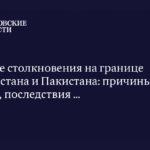Moscow has been hit by abnormal tropical downpours, thunderstorms, and hail. According to weather forecasts, up to half of the monthly average rainfall is expected on July 4, with heavy rain continuing in some areas until the end of the day. Due to strong winds with gusts of up to 17 m/s, a storm warning has been issued in Moscow and the Moscow region. Footage from eyewitnesses shows that Vyborgskaya Street in the capital is flooded—water is knee-deep, and cars are literally floating.
A similar situation is occurring in Ramenskoye, Moscow region. “After every heavy rain, the roads get severely flooded. The storm drains simply can’t cope. The water eventually recedes, but not immediately. The situation on the roads has improved for now: most of the water has drained through the sewers, and there are fewer puddles. Personally, such flooding isn’t critical for me—my car’s clearance allows me to drive through. But if the rain lasted all day, I think the flooding would be much worse, and we’d see many frustrated drivers with stuck cars. Where I drove, Fourth Quarter Street was affected, and the exit from Chugunova to Kosmonavtov had a lot of water. On Fabrichny Proezd, the water was up to the curbs, and everything near the tax office is flooded too. I felt sorry for the car.”
According to weather reports, in some areas of the Moscow region, the amount of precipitation may exceed the average monthly levels. The biggest danger when a car drives into a puddle is hydrostatic lock. “If a person floods the car, there’s an 80% chance the engine will need overhauling because water enters the combustion chamber through the air filtration system, causing hydrostatic lock, which destroys the piston and causes scoring on the block. And if the car sits flooded for a long time, the interior needs drying, all units must be removed, all wiring connectors disconnected, treated with WD-40, and the electrical system restored—that’s another problem. It takes at least two to three days of work per car that was in a flooded area. The cost is around 70,000–80,000 rubles.”
Moreover, if the car breaks down, insurance may not always cover the damage. “Not all comprehensive insurance policies protect against hydrostatic lock. You need to check the insurance terms. So even if you have comprehensive coverage, it doesn’t mean you can plow into a huge puddle at full speed without a care. If you must drive, you can temporarily remove the air filter cover and cross the water obstacle. In this case, pressure won’t suck water from below since the seal is broken, and after passing the puddle, everything should be put back.”
Additionally, the court may not always side with the driver in such situations. “If a driver goes to court for compensation, the issue of their conscientious behavior will be considered—how knowingly they drove into a hole or puddle. If the flooding didn’t occur while driving, the car was parked correctly, but damage was caused by a river overflowing or abnormal rains, then it’s necessary to determine if there was any negligence by those responsible for river dredging, flood control measures, etc.
In our practice, there have been cases where several premises and cars were flooded due to a river overflowing, and we managed to prove that the Ministry of Natural Resources of the relevant region didn’t take measures to clean or dredge the river, as required by regulations. Compensation for damages was successfully recovered. It’s very difficult for an individual driver to gather evidence that the relevant services, road services, the Ministry of Natural Resources, etc., are at fault.
The most effective way to protect oneself here is to contact supervisory control authorities, primarily the prosecutor’s office.”
Despite the bad weather, Aeroexpress trains to Sheremetyevo and Domodedovo are running on schedule, according to the carrier. The forecast indicates that the bad weather will persist until mid-week. By the weekend, the sun will gradually return to Moscow. “At night, the precipitation will also be significant. Tomorrow afternoon, it will start to weaken; it will be cloudy with frequent clearings, and the sun will appear. The weather is rainy but warm—+23–25°C, with night temperatures also quite high—+14–17°C. On Wednesday, July 6, there will be a wonderful sunny day and a warm night—+15–17°C, up to +20°C at night in central Moscow and +25–27°C during the day. From Thursday, temperatures will begin to drop, but it can’t be called a cold snap. Until the end of the week, night temperatures will be up to +10–15°C and



